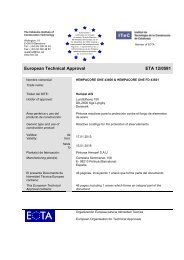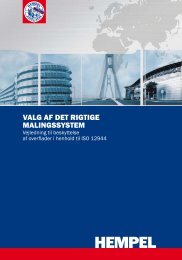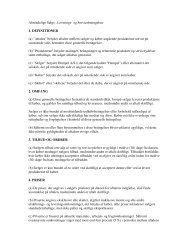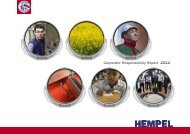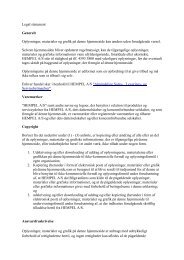Corporate Responsibility Report 2012 - Hempel
Corporate Responsibility Report 2012 - Hempel
Corporate Responsibility Report 2012 - Hempel
Create successful ePaper yourself
Turn your PDF publications into a flip-book with our unique Google optimized e-Paper software.
Helping child labourers into education<br />
As a part of our ethical standards, <strong>Hempel</strong> is committed to not using any kind of child labour, either<br />
directly or through our suppliers. We also believe that children should have access to a good education<br />
and so help fund projects that focus on giving children the opportunity to leave work and attend school.<br />
One such project helps child labourers in the brick kilns of West Bengal in India leave work and start education.<br />
The <strong>Hempel</strong> Foundation is working with Save the Children to build two education centres, where<br />
children get an effective pre-education (as well as food and healthcare) instead of working. The aim is to<br />
equip the children with the skills they need to enter the educational system.<br />
Building new schools<br />
In some cases, children are not able to attend school because there is simply no school for them to go<br />
to or the school is too far away for them to make the journey each day. We support projects in different<br />
areas of the world to build new schools and hire and train teachers.<br />
In Saboda in northern Ghana, for example, many children must walk up to 15 kilometres just to get to<br />
school. Working with the Danish non-government organisation IBIS, the <strong>Hempel</strong> Foundation is funding the<br />
construction of eight satellite schools, giving 800 children a chance to attend school.<br />
Improving local schools<br />
One of the main reasons that children drop out of school, especially in poor areas of the world, is because<br />
the quality of the school they attend is very low. The majority of the <strong>Hempel</strong> Foundation’s education projects,<br />
therefore, focus on upgrading schools to a level that enables the children to attain the education<br />
they need to build a better life for themselves and their families.<br />
Migrant schools in China are one example. Due to recent economic growth, millions of workers and their<br />
families have moved to the big cities, and private schools have been set-up to cope with the influx of<br />
children. However, many of these schools are short of funds. Working with Save the Children, the <strong>Hempel</strong><br />
Foundation supports five private migrant schools in Shanghai by helping train teachers and school managers,<br />
developing teaching materials and running workshops with parents.<br />
After school education and clubs<br />
Many developed countries still have segments of the population who live in poverty. Often, children in<br />
these areas go to school, but struggle to reach their full potential as their family situation and life in the<br />
neighbourhood is not conducive to study. In these cases, after school projects give children a chance to<br />
improve their grades and get away from the difficulties of their everyday lives.<br />
In Rio de Janeiro, for example, the <strong>Hempel</strong> Foundation works with the non-profit organisation Gol De Letra<br />
to improve education and cultural development of young people in the poorest areas of the city. Started<br />
by two Brazilian soccer players, the organisation runs classes for children to improve their academic performance<br />
and encourages them to help with cultural activities in the district.<br />
32





